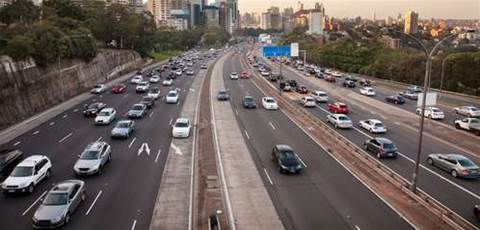The Coalition plans to resurrect a proposal to roll out automated number plate recognition (ANPR) technology nationally, in a bid to track the movements of criminals and gangsters near airports and waterways.
Releasing its crime-fighting policy today, the Coalition said the technology would be an effective way to "monitor vehicle approaches to airports and ports".
"If elected, the Coalition will commission an urgent scoping study for the roll out of ANPR to be operated by CrimTrac, for the approaches to airsides and waterfronts," the combined Liberal and National parties said.
"This will enable law enforcement and criminal intelligence agencies to identify people and organisations whose attendance at these locations may be unauthorised or suspicious."
A parliamentary joint committee first recommended a national number plate recognition system in 2007, which formed the justification for a two-year scoping study by CrimTrac which wrapped up in April 2009.
That scoping study paved the way for a national trial, which was largely abandoned due to lack of funds, according to an executive briefing note released by CrimTrac under freedom of information. (pdf)
The scoping study is said to have covered applications of the technology for national security; but has not been made public.
iTnews has sought access to the initial scoping study but had not received it at the time of publication.
Xamax consultancy principal Roger Clarke told iTnews CrimTrac had been attempting to get a national ANPR proposal "up for years", with limited success.
Clarke has previously published a set of principles that could be used to govern a best-practice ANPR deployment.
"In the event that [the Coalition] came up with a reasoned scheme that said, 'We understand your principles. Here's a very specific proposal, it's on a tight time loop, the access controls are as follows, the uses are limited by statute to the following things', we'd look at that as we'd look at any proposition," Clarke said.
"Clearly there are some circumstances in which various kinds of visual surveillance are a good idea. We're all in favour of appropriate security."
However, Clarke said any investment in ANPR also required police resources to be on hand to act on information captured by such systems.
"You've got to back it up with resources," he said. "You've got to be able to do something about the person who's driving there at the time."
The ACT Government is already a user of ANPR technology, which it uses to monitor speeding.
Privacy advocates have long raised concerns about the potential for ANPR surveillance to be extended beyond its original scope.
The Coalition's crime policy also introduces a $50 million pot of money to tackle "local crime problems", such as by installing more CCTV cameras.
It also commits to creating "a voluntary national register of CCTV locations" that will be "accessible through law enforcement agencies' computer mapping services to enable them to quickly identify likely sources of evidence".







_(21).jpg&h=142&w=230&c=1&s=1)
.png&h=142&w=230&c=1&s=1)



.jpg&w=100&c=1&s=0)
_(8).jpg&w=100&c=1&s=0)











